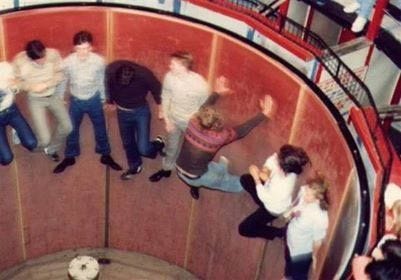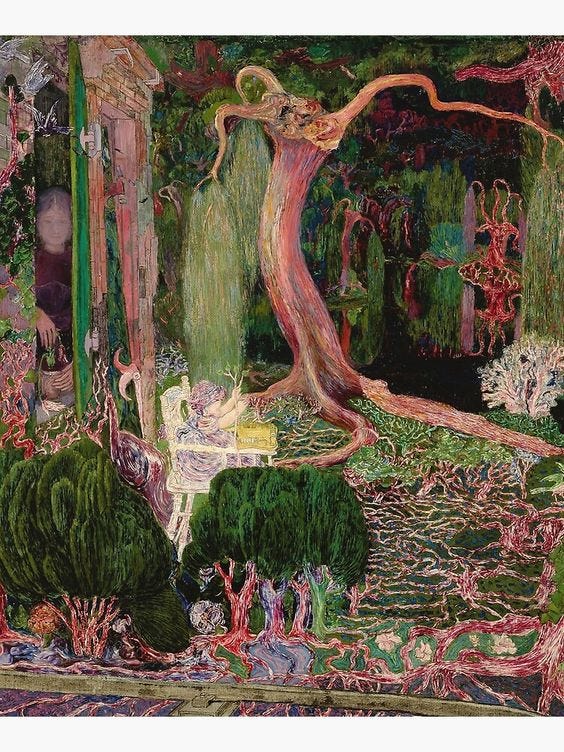What is collapse and why do men dream of it? Why, in these muddy days, do some envision it with almost a sense of relief? Why does the notion of no time-slicing tsunami leave many with dread and mind-numbing exhaustion?
Recent discussions about whether not collapsing is worse than collapsing caused some thoughts to come to my own mind. It also seemed like a charmingly deranged enough topic to return to Substack after almost a year-long hiatus (say a prayer of welcome to baby #5; despite the initial prognosis Hope still dwells in hearts that will have Him).
We are not living in the early 20th century between the Depression and the Wars and the Gulags and the Camps. It is not the Inquisition or the collapse of Rome. It is not even the Plague. For to not end seems almost worse than to end, and no future seems possible in either case.
It is not the horror of man’s inhumanity to man at stake, which the 20th century plumbed to new depths. For, God have mercy on us, what passes for civilization went on. Periods of chaos, murder, torture came and went. But in each time the elements of the world remained.
Without recounting the thousand and one invasions of reality from the rebellion which began in our minds, it is enough to know that today our water has been poisoned, our air poisoned, our earth poisoned, our bodies poisoned. Our plants and animals are mutilated in labs and factories, and the invasion goes into the most minute parts of their being. A chicken is not a chicken. A boy is not a boy. A tomato now has fish sequences and ripens under fluorescent lights. Chickens, children, and tomatoes are rarely or never kissed by the sun.
The atomic rebellion, started by men in labs cut off from reality centuries ago, has come to see only atoms and elements. Iain McGilchrist’s “The Master and His Emissary” is a modern telling of the most ancient story, recounting how our left hemisphere hacks away at the greater whole. It has seized the power to try something new in the world: it has tried to wage a reformation at what it thinks is the deepest level of our beings. It’s wrong, and we will perish if we don’t find the humility to see it is an incomplete understanding of reality.
The techno-utopians and managing class may disagree with the tint of my analysis but I do not think they would diverge much from the core. Indeed most proudly admit this is the goal: to step into our destiny as the managers of reality. When these hollow men encounter DNA, they think it is a merely code they can hack and re-arrange in the cause of their own power. It has never occurred to them it is a sort of song, an echo of a deeper harmony to which we are invited as beloved guests, not feared tyrants.
It is Dr. Frankenstein’s utopianism, hubris, and tone-deafness which has yoked and dragged us into the Gravitron. It is not merely our lives we stand to lose, but our minds, souls, and connection to reality itself.
During the Viking raids you could run to lock yourself in the church with your neighbor. Today your neighbor seems just as likely to become a berserker on the way and attack a dozen loves ones before imploding. Your neighbor is under severe strain. The axis of the world falters. The moon is fodder to be blown up, or colonized, or mined; whatever its fate at the hands of machines, it is dead to us. All is dead, all is tortured, and the result is a new world not so much brave as it is sensorily exhausting.
A man living through the Reformation or even the Great War still held artifacts in his hand which held resonance with the earth. Today even our clothing is plastic. When in despair they looked up and saw stars. We see electro-smog. Our circadian rhythms are in a frenzied fracture and our hormonal cycles are in chaos. We know and perceive a sensation of breaking down becoming more acceptable, from shootings to more “mild” expressions of psychotic, dangerous, and deranged behavior. We are aware people are losing their ability to maintain a stiff upper lip which, regardless of other meanings, makes the public sphere a place people can trustingly sit side by side with strangers.
Our youth are enclosed in houses, not knowing neighbors, not playing in nearby fields, not knowing stars. The entertainment they are given engage less the mind or the hands, but entrap the mind in a spiral of dopamine reactions. They are bred both to crave and to dread a psychologically-overpowering series of artificial stimuli which will prevent them from developing the necessary capacity for attention which nurtures stability and creativity. Without those things, and fueled by a deranged culture, they are prime fodder for addictions.
Through the folly of their elders and misplaced trust in the reductionist revolution, they are devoured by a society of transactional and fractured relationships. Consolations in the form of drugs fifty times more potent than their grandparents knew, whether that be cannabis or internet porn, are pushed at them. In other profitable scenarios they are confused so profoundly into the depths of their own bodies and minds that the drugs will manipulate not merely the mind but the outer signifiers of the body itself. And men take knives to shave down their very Adam’s Apple.
Why not attack a nominal reminder of our previous attempts to know as God without loving as God? And for those who know that as long as we cannot love as God we cannot know as God, this would be the worst fate of all. To know but not to love.
The Holy Trinity is the pinnacle of human understanding of God because relational love is its form and function. Inscribed in our human nature is the desire to follow this path through the family, a path of loving relationships rather than atomized, lonely control. Culture after culture has found it despite our human struggles against love and responsibility, and yet this image of the family arises despite all left-minded revolts to merely control and consume.
It’s not coincidental the light of the Holy Trinity, the starry heavens, and the human family are all attacked by this reductionist techno-utopianism. The Machine bears no rivals but we were not made for the Machine. It worsens our first sickness and takes it to the deepest part of our ability to navigate reality. So how can a heart not completely surrendered to the machine want to live long in this new artificial world without even the hopeful reminders of reality? Why not beg a reckoning?
The future doesn't look like a long muddy cold war. It looks like people clutching the side of a mad teacup carnival ride, knowing at any moment the person next to you may finally give up and detonate themselves. It seems unbearable, it seems made to deliberately be unbearable, and yet putting down our rebellion against the world and ourselves is the only thing we're not allowed to do. So yes, even the lights turning off at the carnival seems preferable to what increasingly amounts to endless torture of the mind and body. God have mercy on us all if such a damaged and spiritually broken people were to face that scenario. God have mercy on us all anyway. I see no past disaster that resembles the insanity drowning so many minds.
To be condemned to ride the Gravitron in such circumstances forever is indeed a terrible torture. How does one even think inside a Machine which disintegrates everything within? Jeremy Naydler’s brief and beautiful book, “The Struggle for a Human Future,” ends with some practical aid that anyone still devoted to God’s light can take to heart, and it begins with remembering and seeing light anew.
Hold to true light. Remember it. When you can, bring it into your home. Live alongside it. When you cannot, let the memory of it grow into your heart. Let the memory be a renewed pole star in the dismantled reality of the Gravitron, even if you can only find it within the heart. Let this transformed heart testify to justice, mercy, and hope wherever it finds itself. The heavens must now be seen by the eyes of the heart if the eyes of the body cannot find them out.
The gates of Hell may surround and capture love itself, but that is its own punishment. Noise may attack the lights, but love will remember and so it will forever spring eternal.







I'm so grateful that you are writing publicly now. It's a privilege to support you.
Beautiful, Tara!